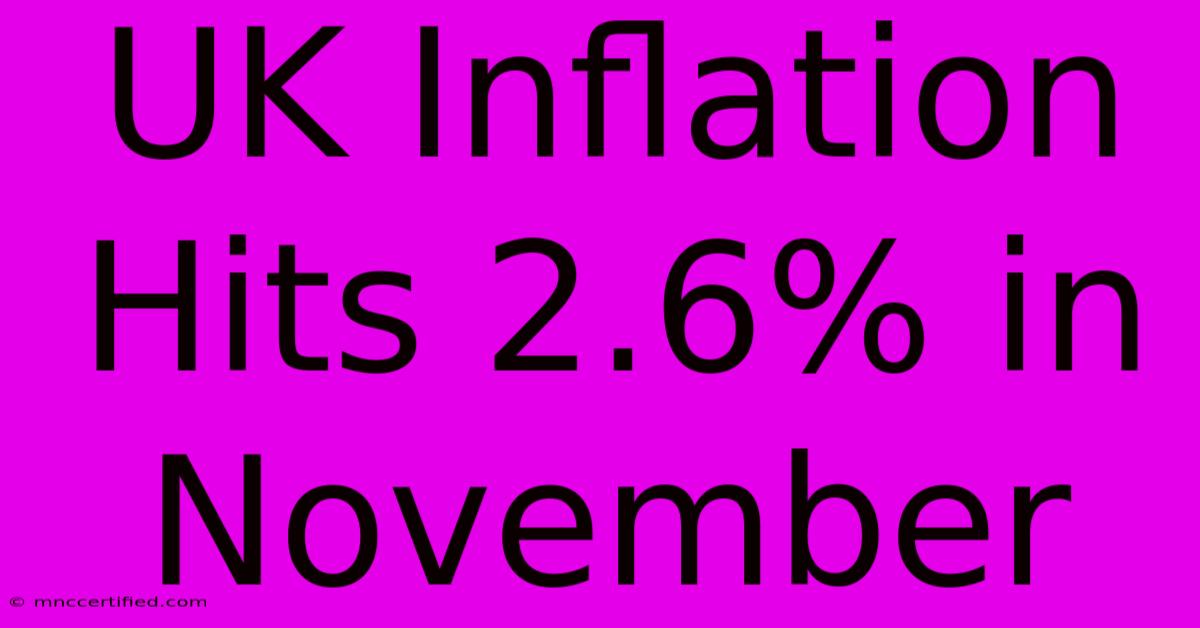UK Inflation Hits 2.6% In November

Table of Contents
UK Inflation Hits 2.6% in November: A Deeper Dive into the Numbers
The UK's inflation rate climbed to 2.6% in November, according to the Office for National Statistics (ONS), exceeding expectations and marking a significant jump from the previous month's figure. This development has sparked renewed debate about the Bank of England's monetary policy and its potential impact on the UK economy. This article delves into the key factors contributing to this rise and analyzes its potential consequences.
Understanding the November Inflation Figures
The 2.6% inflation rate represents the fastest pace of price increases in nearly three years. Several factors contributed to this surge:
-
Rising Energy Prices: A significant driver of the November inflation increase was the substantial rise in global energy prices. The cost of gas and electricity saw notable increases, directly impacting household bills and contributing significantly to the overall inflation figure. This is a global phenomenon, but the UK's reliance on energy imports makes it particularly vulnerable.
-
Supply Chain Disruptions: Ongoing supply chain bottlenecks continue to exert upward pressure on prices. The global shortage of semiconductors, impacting the automotive and electronics sectors, alongside difficulties in transporting goods, are key factors. This leads to higher production costs, which are then passed on to consumers.
-
Increased Demand: As the UK economy recovers from the pandemic, demand for goods and services is increasing. This increased demand, coupled with supply chain constraints, creates a classic inflationary pressure. This is particularly noticeable in sectors like hospitality and leisure.
-
Brexit Impact: While disentangling the specific impact of Brexit from other factors is complex, some economists argue that leaving the European Union has contributed to increased import costs and labor shortages, both indirectly impacting inflation. This remains a subject of ongoing debate and analysis.
Breaking Down the Inflation Components
The ONS provides a detailed breakdown of inflation across various sectors. While energy prices were a key driver, other areas also saw significant price increases. Analyzing these components provides a more nuanced understanding of the inflationary pressures at play. For example, food prices also showed a noticeable increase, impacting household budgets. A detailed study of these component parts is crucial for formulating effective policy responses.
Implications for the UK Economy
The higher-than-expected inflation rate poses several challenges for the UK economy:
-
Cost of Living Crisis: Rising inflation directly impacts the cost of living, squeezing household budgets and potentially leading to decreased consumer spending. This can have knock-on effects throughout the economy.
-
Bank of England Response: The Bank of England is likely to closely monitor inflation figures and may consider adjusting its monetary policy accordingly. This could involve raising interest rates to curb inflation, but this carries its own risks, potentially slowing economic growth.
-
Wage Growth: If wage growth fails to keep pace with inflation, real wages will decline, further impacting household disposable income and potentially leading to social unrest.
-
Uncertainty for Businesses: Inflationary pressures create uncertainty for businesses, making it harder to plan for the future and potentially impacting investment decisions.
Looking Ahead: What to Expect
Predicting future inflation is inherently challenging. However, several factors will play a crucial role in determining the trajectory of UK inflation in the coming months:
-
Global Energy Prices: Continued volatility in global energy markets will be a significant factor influencing UK inflation.
-
Supply Chain Recovery: The speed of recovery in global supply chains will directly impact inflation pressures.
-
Government Policy: Government interventions, such as targeted support measures or changes in taxation, could influence inflation.
-
Bank of England Actions: The Bank of England's response to inflation will shape the economic outlook.
The rise of UK inflation to 2.6% in November is a significant development with broad implications for the UK economy. Understanding the contributing factors and their potential consequences is crucial for both policymakers and individuals navigating the current economic landscape. Further analysis and monitoring are essential to track the evolution of inflation and its impact on the UK population.

Thank you for visiting our website wich cover about UK Inflation Hits 2.6% In November. We hope the information provided has been useful to you. Feel free to contact us if you have any questions or need further assistance. See you next time and dont miss to bookmark.
Featured Posts
-
Isle Of Man Stamps Sir Name Collection
Dec 18, 2024
-
Chelsea Real Madrid Womens Champions League
Dec 18, 2024
-
Keely Hodgkinsons Coaches Painter And Meadows
Dec 18, 2024
-
Conor Mc Gregor Vs Logan Paul Boxing
Dec 18, 2024
-
Hardy Covers 317k Crew Wages
Dec 18, 2024